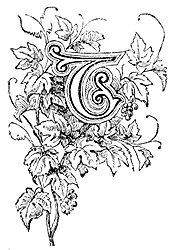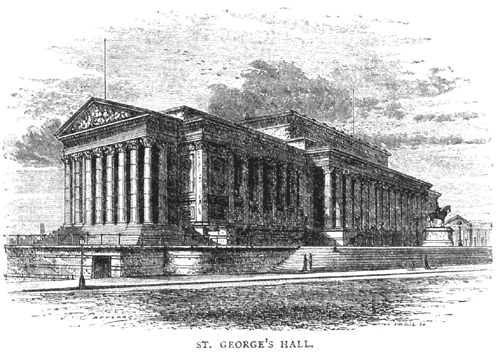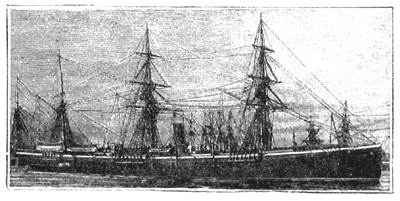 |


HERE are varieties of the picturesque, and one of these
must surely be a great half-maritime town such as Liverpool, the second
city of the Empire. The Mersey has the greatest share now of the carrying
trade of the world, and its bosom, studded with vessels, and its immense
docks, give a striking character to the place.
Yet, comparatively, the Mersey is a modern river; it was unknown,
as it now is, to the Romans; at least their geographer Ptolemy makes no
mention of it, though he names other and now smaller rivers. The stream in
those old days must have peen a mere brook at the part where the ferry steamers
now go, with probably marshes on each side of it. The bed has sunk, the marshes
have been flooded by the river, and in process of time the present river
appeared. This is confirmed by the appearance of remains of engulfed oak
trees, that, not very long ago, were to be seen when the tide was out on
the northern margin of the stream. Liverpool was the name of the estuary (then
perhaps not much more than a "pool") that is now so magnificently wide -
1,200 yards at its narrowest.
Birkenhead, a town or suburb only forty years old, but almost a new
Liverpool, gives a little picturesque land effect to the estuary, for it
covers the nearer slopes, and thus towers, spires, and vistas of trees adorn
them.
But inland it is impossible to think Liverpool picturesque; the ordinary
hill, dale, and wood of lovely England are not to be seen here. But the sea-wall,
the landing-stage, and the enormous extent of docks, as we have just said,
is a variety of the same thing.
The landing-stage is a third of a mile in length, adjusting itself
to every turn of the ride, and, covered with human beings who are experiencing
almost every emotion, it is full of interest. Here dear friends part, perhaps
for ever; some departing to the other side of the ocean, while others are
arriving and warmly welcomed. Tears and smiles are side by side with fear
and suspicion, as the criminal tries to escape from Liverpool to America.
How many human tragedies are played on this landing-stage!
And then the water area of the docks - it covers 265 acres at least,
we are told, and the quay margin is nearly twenty miles in length.
The ships that crowd the Mersey are another feature. Here are the
great steamers of the Cunard, Allan, White Star, and Inman trade, with countless
merchantmen, the South American steamers, and those that go to the East
and West Indies, China, Japan, and the west coast of Africa; for Liverpool
is the provider of the world, sending forth the wares of the nation, and
also supplying the uncultivated lands with men; for the emigrants of many
lands - not only England - go from hence to America, etc. Admirable arrangements
are made for their departure, and hither come Danes, Swedes, and a few
Russians, as well as English and Irish. In 1885, 183,502 emigrants embarked
on the Mersey; of these 74,969 were English, 1,811 Scotch, 27,986 Irish;
foreigners, 74,115. Our readers may imagine the piles of luggage, the babel
of tongues, on the great landing-stage as these wanderers depart to till
and people the waste places of the earth.
In fact, the landing-stage is an incessant scene of coming or departing
ships, full of the trade and the travellers of the world High up the river
a guard ship - a man-of-war - is stationed, and four old men-of-war that
have become training ships for boy seamen. The Conway is for young officers;
the Indefatigable gives gratuitous training to sons of sailors, or to homeless
boys; the Akbar and the Clarence are reformatory ships, the one for Protestant
boy criminals, the other for Catholics, and both have done good work in
reforming juvenile offenders.
The loading and unloading of the enormous cargoes brought to Liverpool
are done by dock-men under a stevedore, a person who contracts to do this
work, and engages any number of men he may require for it. Most of the dock-men
are Irish, and congregate together in certain parts of the town, where
they still keep up their love of faction fights. Of course there are dart:
places here as everywhere.
Liverpool is not a very ancient town. It was originally a fishing
village, but the advantages of the estuary of the Mersey were perceived,
and a charter was granted to it as a borough in 1207; yet in Edward I.'s
time it consisted of less than three hundred houses, and for Edward III.'s
French naval battle (at Sluys) Liverpool contributed only one bark and a crew
of six men.
The church of St. Nicholas was erected about this time, but nothing
remains of the original building. The body of the church was pulled down
and rebuilt in 1774, and in 1815 the tower was removed and the present beautiful
lantern tower built. The old graveyard, however, still remains, once full
of trees. St. Nicholas is the patron saint of seamen as St. Peter is of
fishermen.
Trade with Ireland was followed by trade with the North American
plantations (or colonies), and the value of sugar induced Liverpool, as
it had Bristol, to enter into the slave trade. There were good and wise men
who protested against this wicked traffic, but vainly; and the first speech
of Mr. Gladstone in the House of Commons was one in defence of his father's
slave estates in the West Indies. The trade began in these towns by the barter
of their manufactures for slaves, and the sale of the poor creatures afterwards
to the sugar planters, and the Virginian tobacco planters.
In the first years of George III. slaves, both male and female, were
sold by advertisement in Liverpool. We thank Heaven that the flag of England
has been cleansed of this base stain, and in spite of all the opposition to
Wilberforce and Clarkson, and the prophecies of ruin if it were abolished,
we find we prosper more without the slave trade.
To Liverpool we owe the first of the great steamer Companies, i.e.,
the Peninsular and Oriental, followed by so many others; it was indeed on
the Mersey the first steamboat steamed in 1815.
Liverpool, as we have quoted, is not a manufacturing town; it is
the agency by which the products, mechanical or otherwise, of different
places are dispersed over the habitable globe. The Liverpool merchant is
in correspondence with the whole world, and supplies all its needs. They
are the richest of all save those of London, and they spend their money liberally,
even in a princely spirit.
Liverpool has fine public buildings; the best of them, however, is
St. George's Hall, which admirably reproduces rather than imitates the architecture
of ancient Greece. Its eastern facade is 400 feet in length, and at the southern
end is a Corinthian portico, beautifully and fully ornamented. furness_abbey.htmlThe Free Library,
the Art Gallery, Public Offices, and the Exchange, are fine buildings. The
Free Library is much frequented by readers, and the inhabitants of Liverpool
support literary and scientific institutions, and societies for music and
the fine arts very liberally. There are also numerous charitable and educational
institutions in this great Lancashire city.

In the reign of Charles II. a Liverpool merchant having sustained
some damage by a Spanish man-of-war, brought an action in Westminster Hall
against the king of Spain. His suit was successful, and the king of Spain
was outlawed. This sentence sounds absurd, but it was not so, for it deprived
the royal Philip of power to proceed in the English Courts against the British
merchants upon whom he had claims, and Gondemar, his ambassador, was glad
to settle any demands of the Liverpool merchant in order to replace his
royal master within the pale of the English law.
Liverpool has given birth to many great and illustrious men and
women. Mrs. Hemans, the poetess; William Roscoe; William Rathbone; and at
Highfield, near Liverpool, was born James Parke, Lord Wensleydale, one of
the ablest of our judges, a man of the highest intellect and great social
talent. He died in 1868, greatly lamented.

|
 |